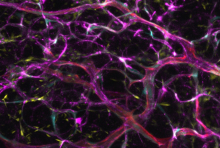
Early-career Scientists and Clinicians Sharpen Entrepreneurial Skills in BioVenture eLab Program
December 17, 2025
From light-activated pain relief to next-generation cancer immunotherapies, early-career scientists and clinicians at Weill Cornell Medicine showcased bold ideas for translating lab discoveries into real-world treatments.

Improving Lives Through Academic Innovation, Commercialization and Entrepreneurship
December 5, 2025
Weill Cornell Medicine’s Ninth Annual Dean’s Symposium on Innovation and Entrepreneurship celebrated and fostered Weill Cornell's entrepreneurial spirit on Nov. 17 at Griffis Faculty Club.
The Winding Road from Bench to FDA Approval for First Mitochondria-Targeting Drug
December 4, 2025
Dr. Hazel Szeto's discovery of a first-in-class compound that had mitochondrial therapeutic potential is now a U.S. Food and Drug Administration-approved drug.
Entrepreneurs Share Insights, Startups Rooted in Cornell Compete at Eclectic Convergence 2025
November 7, 2025
Conform Medical, a medical device startup whose foundational technology was developed by Weill Cornell Medicine scientists, competed at the pitch contest of Eclectic Convergence 2025.
Study Pinpoints Source of Free Radicals in the Brain that May Fuel Dementia
November 4, 2025
Researchers have discovered that free radicals generated at a specific site in non-neuronal brain cells called astrocytes, may promote dementia, according to a Weill Cornell Medicine study. Their findings, published Nov. 4 in Nature Metabolism, demonstrated that blocking this site lowered brain inflammation and protected neurons, suggesting a novel therapeutic approach for neurodegenerative disorders, including frontotemporal dementia and Alzheimer’s disease.

Startups Founded on Cornell Innovations Secure State Matching Grants for commercialization
October 24, 2025
With support from Empire State Development’s Division of Science, Technology, and Innovation (NYSTAR), three startups with roots in Cornell innovations are advancing technologies that aim to improve cardiovascular care, cancer treatment and patient well-being. ARMA BIO and VoiceLove, both founded by Weill Cornell Medicine faculty, were among 25 New York-based businesses receiving support in Round Three of the Innovation Matching Grants program.
Galvanizing Blood Vessel Cells to Expand for Organ Transplantation
October 14, 2025
Scientists have discovered a method to induce human endothelial cells from a small biopsy sample to multiply in the laboratory, producing more than enough cells to replace damaged blood vessels or nourish organs for transplantation, according to a preclinical study by Weill Cornell Medicine investigators. Endothelial cells form the inner lining of blood vessels and regulate blood flow, inflammation and healing. Traditional approaches for growing these cells in the lab have yielded only limited numbers before they lose their ability to function.
Innovative Discovery Could Revolutionize Kidney Transplant Rejection Diagnostics: Collaboration for Translation to Clinic
September 16, 2025
For over three decades, Dr. Manikkam Suthanthiran has been dedicated to one goal: making transplanted organs work better and longer in more patients. In 2001, his laboratory discovered that biological evidence of kidney transplant rejection can be detected in urine—a finding that culminated in a patented urine gene expression biomarker test that has been licensed to a biotech company for further commercialization. This noninvasive technology has the potential to predict kidney transplant rejection so that clinicians can intervene early and individualize treatments for patients.
Exploring Human Voice as a Biomarker
September 16, 2025
The human voice is unique for each individual and contains lots of acoustic data. A friend can tell something is not right if your voice sounds a little off. Voice is also widely used to verify a person’s identity. Do you know the frequency, speed of voice and even the way a person coughs can offer clues to health? Clinicians and researchers at Weill Cornell Medicine and their collaborators hope to harness the voice data to detect signs of diseases and train AI algorithm to improve the accuracy of diagnoses and predict disease progression.


